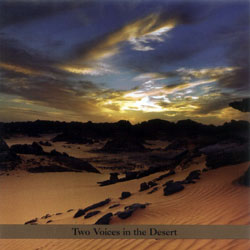
In spite of having played together in a myriad of contexts since 1965, this is the very first recording of clarinetist Perry Robinson (occasionally doubling on ocarina and wooden flute) and pianist Burton Greene as a duo, and the second release on Tzadik which features them, the previous being 2008's Ancestors, Mindreles, NaGila Monsters by the Klez-Edge quintet with Larry Fishkind, Roberto Haliffi and Marek Balata.
In the liner notes, Greene refers to this effort as "one of the most laid-back recordings" of his long-lasting career, and after just a couple of spins the reasons of this statement can be easily understood. A sizeable portion of the disc is characterized by the contributions of composer Silke Rollig, who co-wrote no less than five episodes, although the extended "Desert Suite" — partially re-elaborated by the duo following the basics of the original scores by John Zorn and, again, Rollig — is perhaps the focal point, alternating imaginative improvisation and respect for the piece's unique organization. Other noticeable traits are the masterful management of Jewish airs and sometimes complex rhythms, such as in the opening "Syl's Freylekhs" and, especially, "Burty's Freylekhs", which utilizes 9/8 and 7/8 time structures yet sounds totally intelligible. A non-difficult assimilability is indeed the essential attribute here, thanks to Greene and Robinson's lyric responsiveness and facility in avoiding the dispersal of melodic power only to go looking for worthless difficulties.
What transpires from these songs quite often, also a favorite peculiarity, is a sense of latent sadness — particularly signified by the magnificent "A Lamentation" — made sharper by the intimate interaction and impeccable timbral mixture of the cohorts, who literally sound like a single entity throughout. Even the pieces designed for feet-tapping and head-swinging get somehow informed by this kind of enticingly reminiscent melody, which Greene's suggestive chords and Robinson's supplely good-mannered emission lock in a synthesis of past and present that we welcome at any moment.
Among hundreds of entities who made a name by hiding their inabilities behind "silence", it's sort of relieving — every once in a while — to have the chance of savoring music finely executed by artists who perform, as opposed to pensively posing in front of a table as the buses and the motorbikes in the street constitute what ultimately ends on record (typically in a limited edition). Two Voices In The Desert is an homage to the epoch in which one had to learn to actually play an instrument to express feelings. An album that, in essence, respects the listener.
Comments and Feedback:
|



